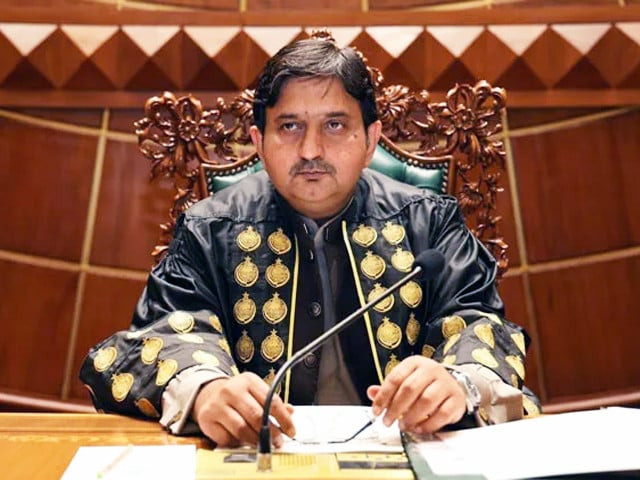LAHORE:
Punjab Assembly Speaker Malik Muhammad Ahmad Khan apparently put the matter of PTI disqualifications to rest on Saturday by ruling the disqualification applications against 26 suspended lawmakers as non-maintainable, but by passing the buck to the judiciary and election tribunal.
The sword of litigation still dangles over the suspended lawmakers, with the speaker making it clear that while his doors were not closed, the petitioners must first knock on the right ones, by securing a declaration from a court of competent jurisdiction before revisiting his office.
In a move seen as a political de-escalation, the speaker has dismissed the applications filed against 26 suspended opposition lawmakers, following a successful round of talks between the treasury and opposition benches.
A six-page ruling signed by the speaker outlines the rationale for rejecting the four separate applications, which sought to disqualify the PTI-affiliated MPAs over their disorderly and abusive conduct during the budget session.
The move to dismiss the applications gained momentum after recent behind-the-scenes negotiations between government and opposition leaders bore fruit.
According to sources, the reinstatement of the suspended MPAs is now expected soon.
It is noteworthy that Speaker Khan had earlier suspended the 26 PTI lawmakers under Rule 210(3) of the Rules of Procedure of the Provincial Assembly of the Punjab, 1997, following their disruption of Chief Minister Maryam Nawaz’s speech on June 27.
In his detailed ruling, Speaker Khan noted: “Though serious legal and constitutional violations, including constitutional oath, have been alleged by the applicants, these violations first need to be established in a court or tribunal of competent jurisdiction before I could decide whether a question of qualification has arisen in terms of Article 63(2) of the Constitution and refer the question to the Election Commission of Pakistan.”
“The people are the source of all power, and through their vote, they confer trust — not to be undone without the gravest reasons. To disqualify a representative is not merely to silence a voice — it is to disenfranchise people. For an elected House is not only a chamber of laws; it is the echo of the people’s will. That voice must not be silenced,” he added.
The speaker ruled that references to past cases, such as the Panama Papers and other disqualification jurisprudence under Articles 199 and 184(3) of the Constitution, were not valid in the current context.
Such petitions, he noted, could undermine freedom of speech in the House and nullify the opposition’s presence. Article 19 protects robust debate — even if abrasive — subject to reasonable legal restrictions.
“These restrictions are found in our Rules, not in threats of permanent disqualification. Let the welfare of the people be the supreme law, the Assembly must remain a forum where dissent is voiced, not extinguished,” the ruling stated.
Speaker Khan stressed that the welfare of the electorate is best preserved when the House handles internal disorder itself, without disenfranchising voters’ chosen representatives.
He also expressed concern about many members’ lack of familiarity with assembly rules, legislative processes, and the effective use of standing committees.
He called for targeted training to uphold parliamentary supremacy and democratic accountability.
“As elected representatives, we must legislate responsibly, put an end to political victimisation, and work together to uphold the supremacy of the people’s Assembly and protect our democracy. Political parties are, after all, the true guardians of democracy and the responsibility to uphold the democratic functioning of the House lies with all of them collectively,” the speaker added.
He called for inter-party dialogue reminiscent of the Charter of Democracy to ensure the Assembly functions effectively as a space for public interest and genuine debate.
Referring to political theory, Khan noted: “Modern societies are built upon dialogue; as Jürgen Habermas wrote, ‘The public sphere is that realm of our social life in which something approaching public opinion can be formed,’ underscoring that free, inclusive and reasoned discourse within parliaments forms the bedrock of democratic communities. Safeguarding this vital exchange of ideas is indispensable for our collective democratic future.”
In a strong critique of constitutional clauses historically used to undermine democracy, Speaker Khan declared: “As Speaker and a political worker, I firmly oppose anti-democratic constitutional provisions. This includes the infamous Article 58(2)(b), and Articles 62 and 63, all imposed by authoritarian dictators, notably General Zia-ul-Haq. These Articles have historically been weaponised to unjustly target elected politicians. We must end this vicious cycle; the Panama Case cannot become another tool like Article 58(2)(b). Otherwise, we succumb to Nietzschean nihilism, believing time is a flat circle and we are condemned to repeat mistakes.”
He asserted that misuse of these Articles undermines the constitutional right to political association and representation under Article 17.
Disqualifying elected representatives on allegations or technicalities violates the presumption of innocence, disenfranchises voters and erodes the legitimacy of parliament.
“The disqualification of elected representatives has deep roots in Pakistan’s history. Early examples are the Public Representative Offices Disqualification Act 1949, and Elective Bodies Disqualification Order (EBDO) 1959. These ‘backdoor tools’ have consistently served non-democratic elements,” the speaker stated.
He criticised political parties for occasionally abetting such practices, citing the Panama “show trial” as an example of judicial overreach that continues to affect the political landscape through undemocratic means.
“This destructive chain must be broken,” Speaker Khan emphasised. “The very fact that the Constitution has been exploited this way means such challenging questions can be, and have been raised.”
He called upon the federal parliament to remove such dictatorial remnants from the Constitution to reclaim democratic values.
Concluding his remarks, Speaker Khan affirmed: “During my tenure as Speaker, I will work to uphold parliamentary rule and the principles of representative constitutional democracy, as envisioned by our great Islamic Republic’s founding fathers.”

